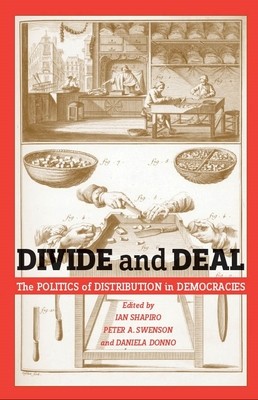
- We will send in 10–14 business days.
- Publisher: New York University Press
- ISBN-10: 0814740588
- ISBN-13: 9780814740583
- Format: 16 x 22.6 x 2.8 cm, hardcover
- Language: English
- SAVE -10% with code: EXTRA
Divide and Deal (e-book) (used book) | bookbook.eu
Reviews
Description
Why are democracies so unequal? Despite the widespread expectation that democracy, via expansion of the franchise, would lead to redistribution in favor of the masses, in reality majorities regularly lose out in democracies. Taking a broad view of inequality as encompassing the distribution of wealth, risk, status, and well-being, this volume explores how institutions, individuals, and coalitions contribute to the often surprising twists and turns of distributive politics.
The contributors hail from a range of disciplines and employ an array of methodologies to illuminate the central questions of democratic distributive politics: What explains the variety of welfare state systems, and what are their prospects for survival and change? How do religious beliefs influence people's demand for redistribution? When does redistributive politics reflect public opinion? How can different and seemingly opposed groups successfully coalesce to push through policy changes that produce new winners and losers?
The authors identify a variety of psychological and institutional factors that influence distributive outcomes. Taken together, the chapters highlight a common theme: politics matters. In seeking to understand the often puzzling contours of distribution and redistribution, we cannot ignore the processes of competition, bargaining, building, and destroying the political alliances that serve as bridges between individual preferences, institutions, and policy outcomes.
EXTRA 10 % discount with code: EXTRA
The promotion ends in 7d.04:25:33
The discount code is valid when purchasing from 10 €. Discounts do not stack.
- Publisher: New York University Press
- ISBN-10: 0814740588
- ISBN-13: 9780814740583
- Format: 16 x 22.6 x 2.8 cm, hardcover
- Language: English English
Why are democracies so unequal? Despite the widespread expectation that democracy, via expansion of the franchise, would lead to redistribution in favor of the masses, in reality majorities regularly lose out in democracies. Taking a broad view of inequality as encompassing the distribution of wealth, risk, status, and well-being, this volume explores how institutions, individuals, and coalitions contribute to the often surprising twists and turns of distributive politics.
The contributors hail from a range of disciplines and employ an array of methodologies to illuminate the central questions of democratic distributive politics: What explains the variety of welfare state systems, and what are their prospects for survival and change? How do religious beliefs influence people's demand for redistribution? When does redistributive politics reflect public opinion? How can different and seemingly opposed groups successfully coalesce to push through policy changes that produce new winners and losers?
The authors identify a variety of psychological and institutional factors that influence distributive outcomes. Taken together, the chapters highlight a common theme: politics matters. In seeking to understand the often puzzling contours of distribution and redistribution, we cannot ignore the processes of competition, bargaining, building, and destroying the political alliances that serve as bridges between individual preferences, institutions, and policy outcomes.


Reviews